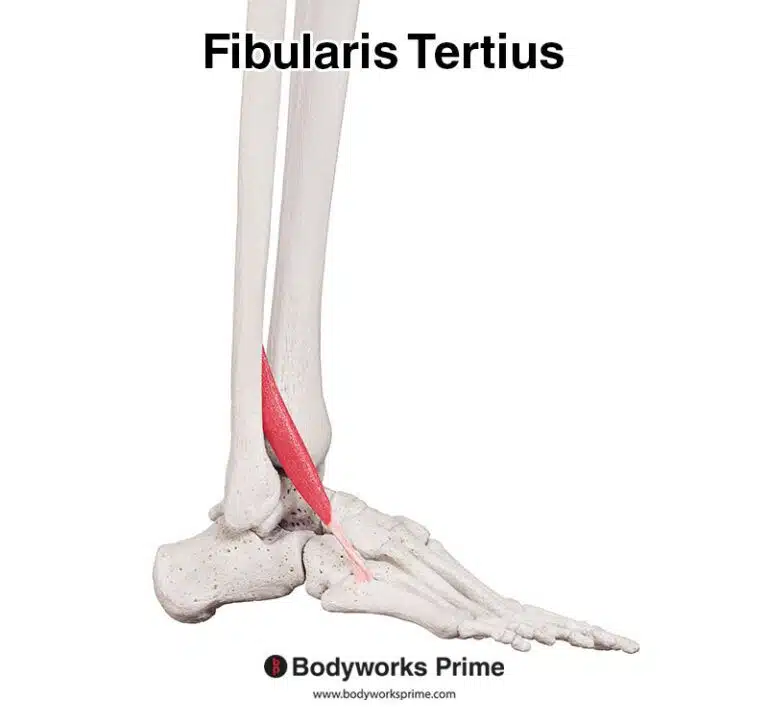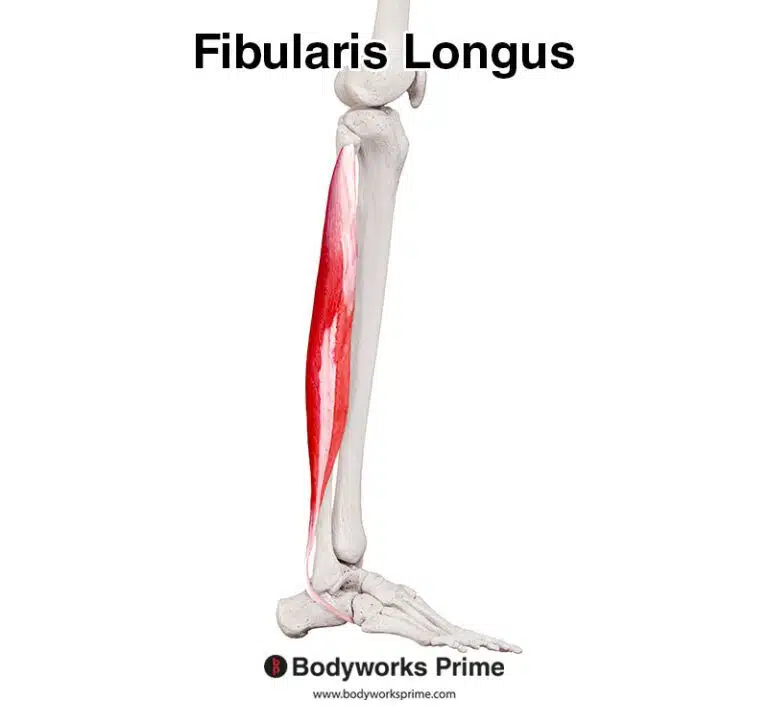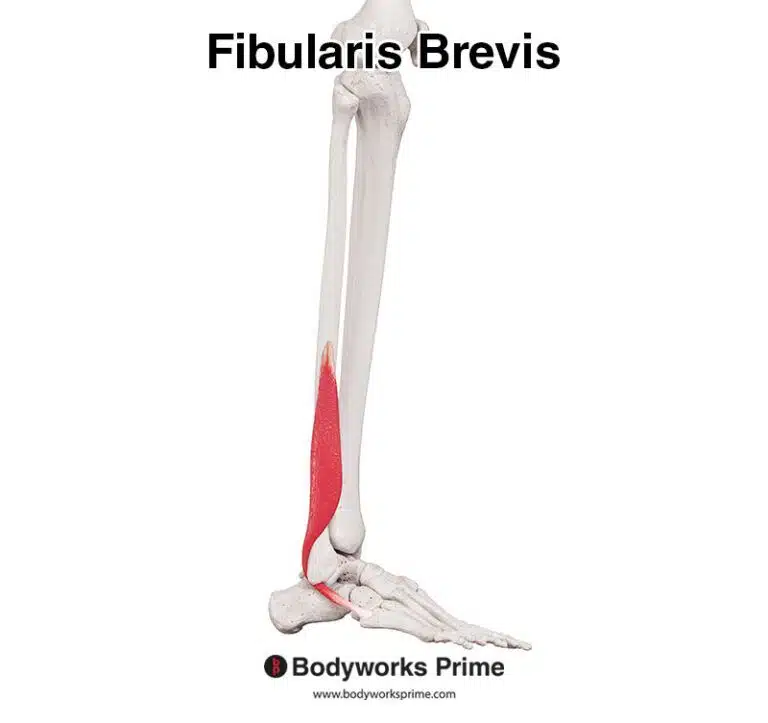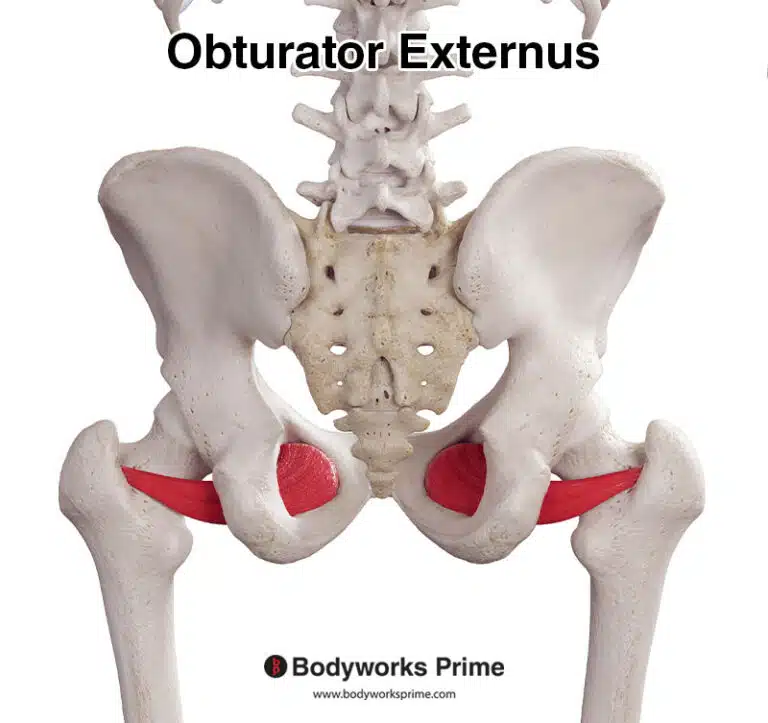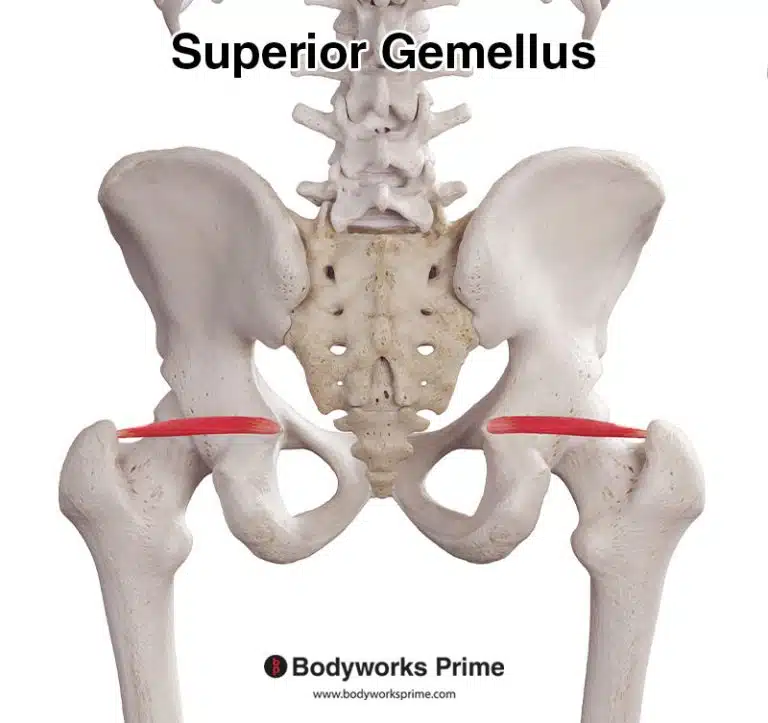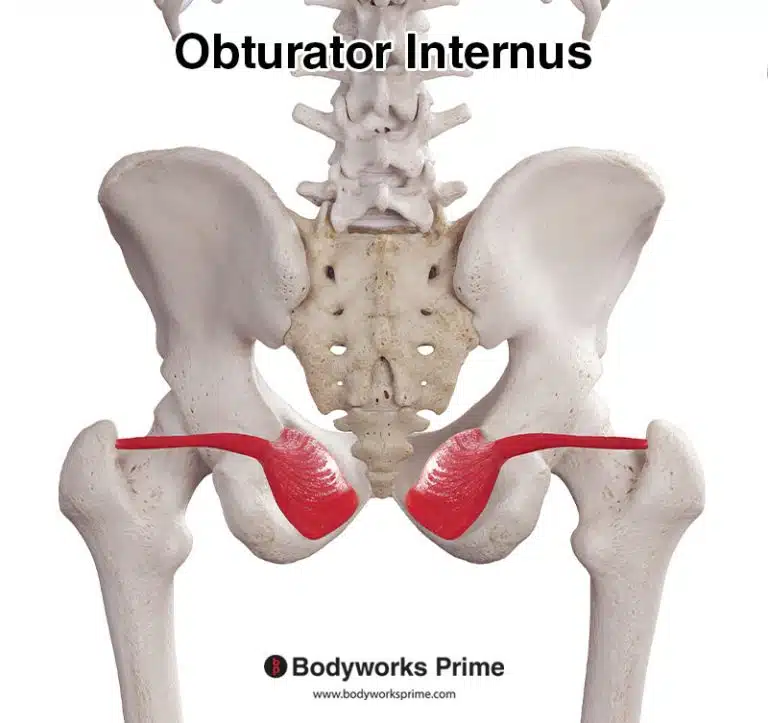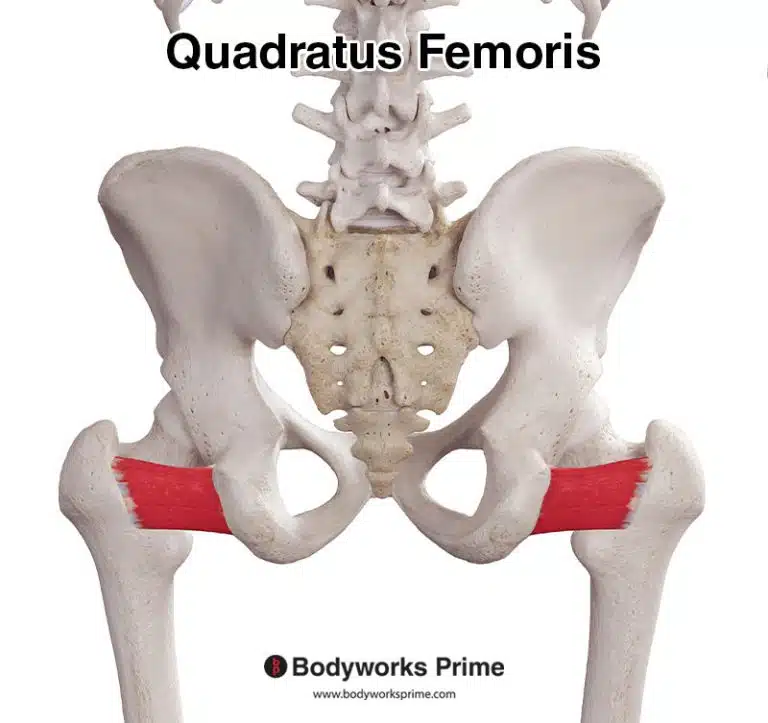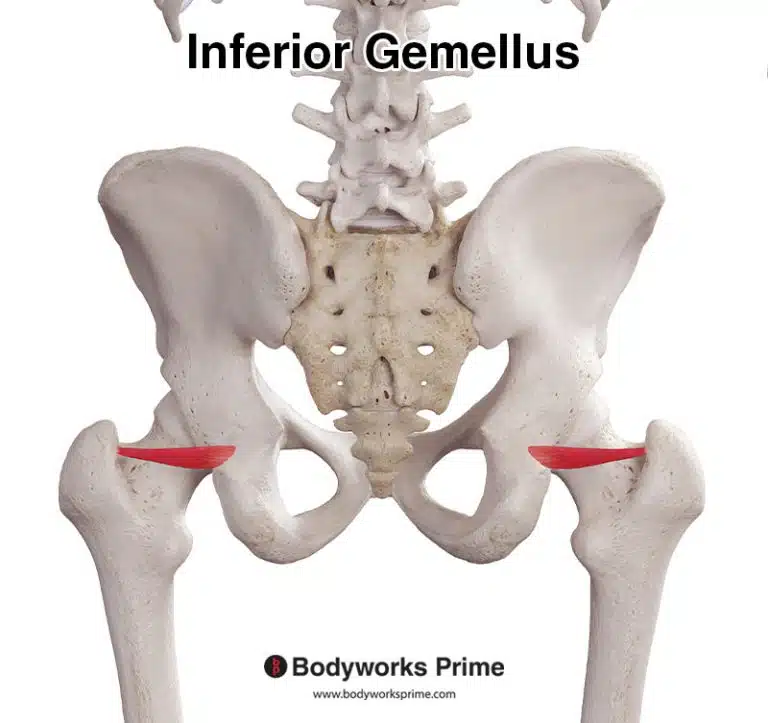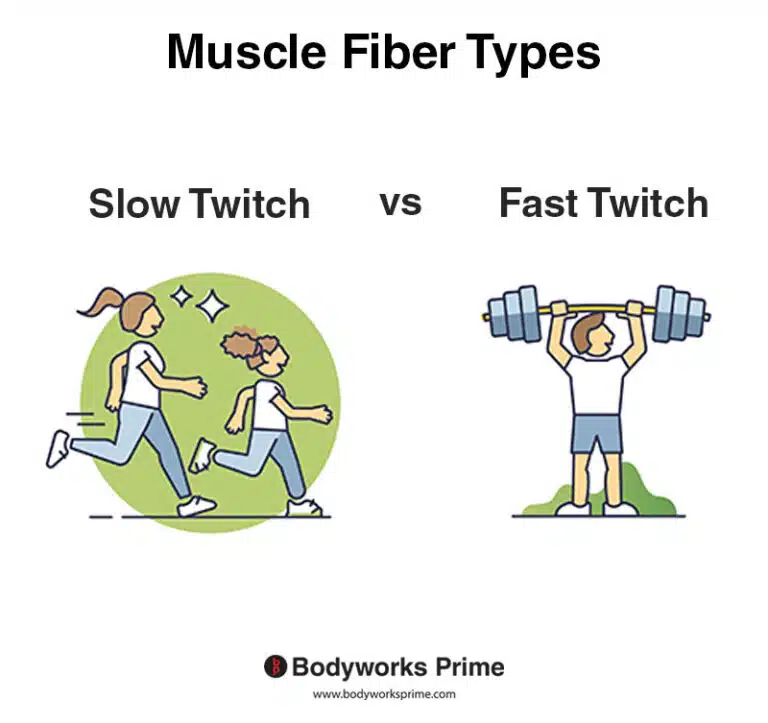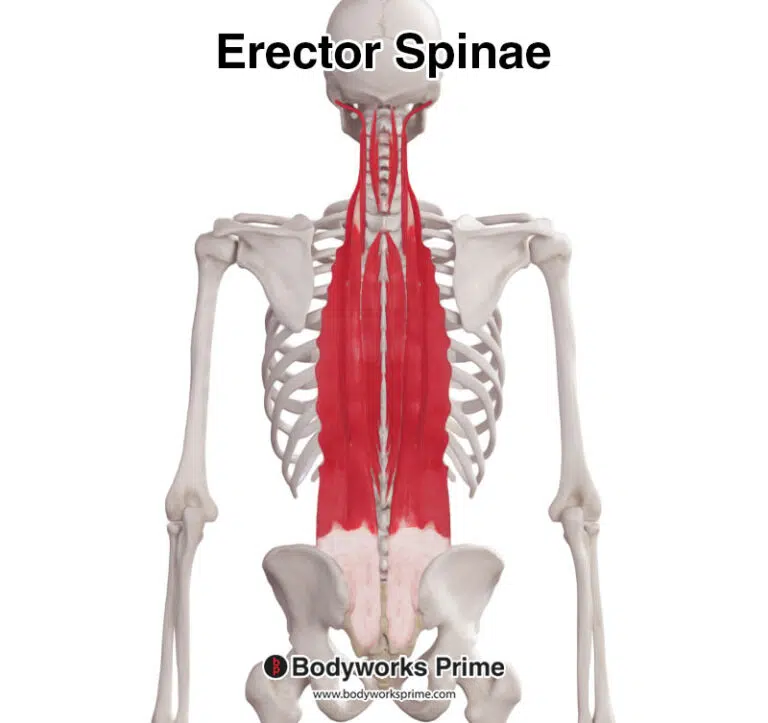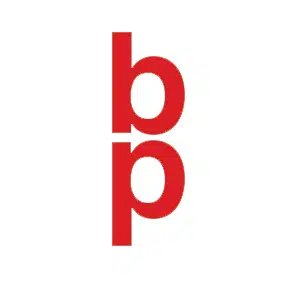| Origin | Coracoid process of the scapula |
| Insertion | Midshaft of humerus (distal to the crest of the lesser tubercle) |
| Action | Shoulder adduction Shoulder flexion |
| Nerve | Musculocutaneous nerve (C5, C6, C7) |
| Artery | Brachial artery |
Location & Overview
The coracobrachialis muscle is a prominent muscle situated in the upper arm region. It is one of the three muscles which attaches to the coracoid process of the scapula. The other two are: the short head of the biceps brachii muscle and the pectoralis minor muscle. The coracobrachialis is the smallest of these three muscles. The coracobrachialis muscle is part of the anterior compartment of the arm, it is located medially to the biceps brachii and brachialis muscles. The primary roles of the coracobrachialis include flexion and adduction of the arm at the glenohumeral joint. It also contributes to maintaining the arm’s alignment in the frontal plane during abduction [1] [2].
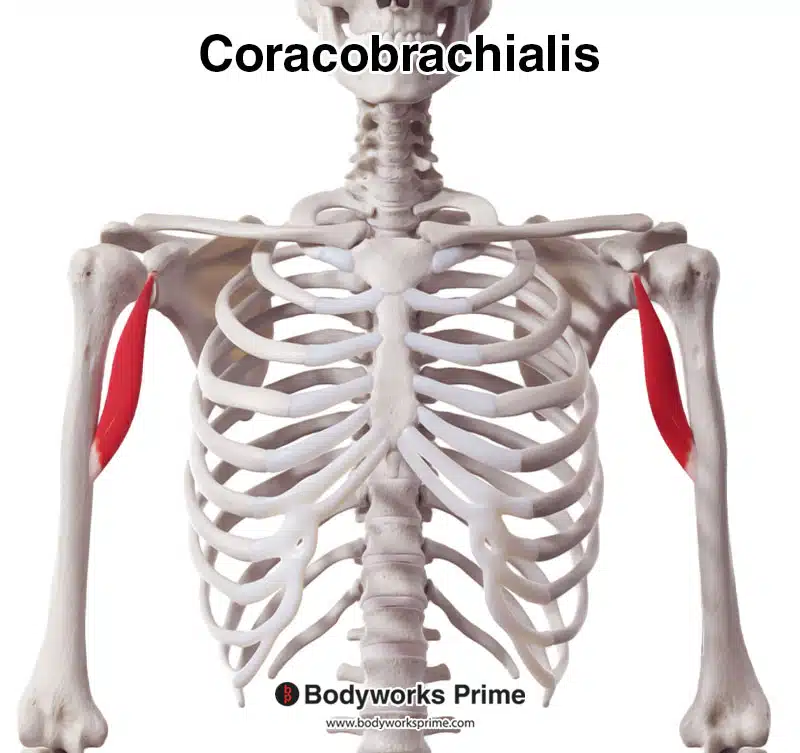
Here we can see the coracobrachialis muscle from an anterior view.
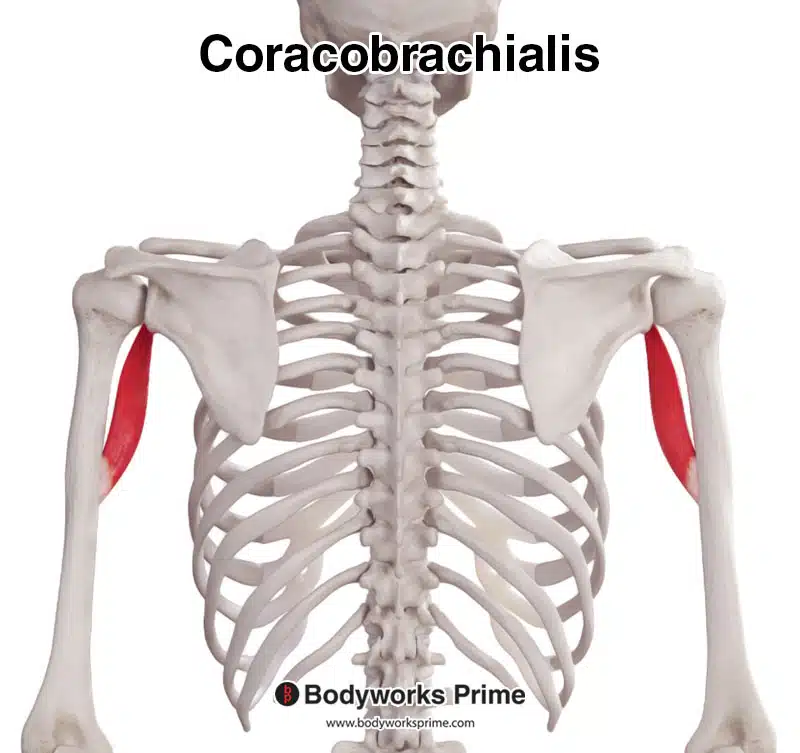
Here we can see the coracobrachialis muscle from a posterior view.
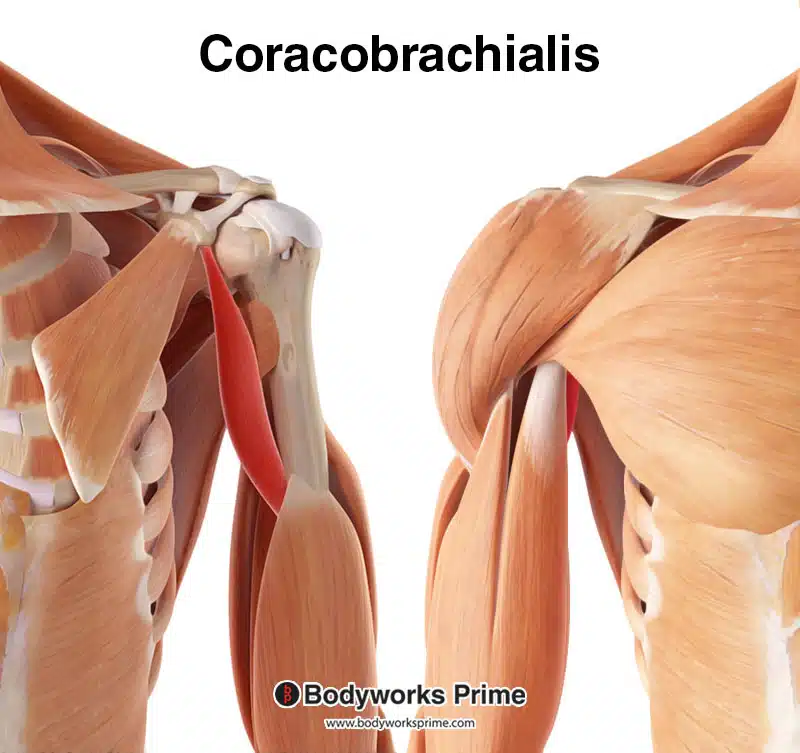
Here we can see the coracobrachialis muscle highlighted in red. On the left, superficial muscles such as the biceps brachii, pectoralis major and deltoid have been removed to reveal the coracobrachialis. On the right, you can see a very small section of the coracobrachialis highlighted in red, behind the biceps brachii.
Origin & Insertion
The coracobrachialis originates from the coracoid process of the scapula, a small hook-like structure on the lateral edge of the superior and anterior portion of the scapula. The coracobrachialis shares the coracoid process’s apex as its origin point with the short head of the biceps brachii muscle [3] [4].
The muscle’s insertion point is located on the medial surface of the humerus. It inserts around the midshaft of the humerus. Specifically, it attaches between the insertions of the triceps brachii and brachialis muscles, anchoring itself by means of a short, flat tendon [5] [6].
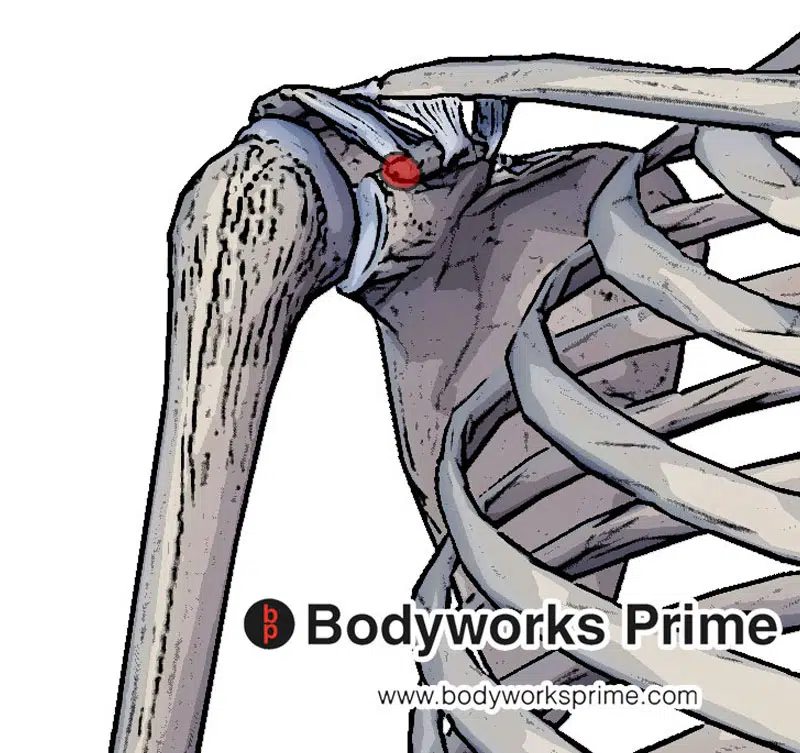
The origin of the coracobrachialis muscle is the coracoid process of the scapula,which is highlighted here in red.
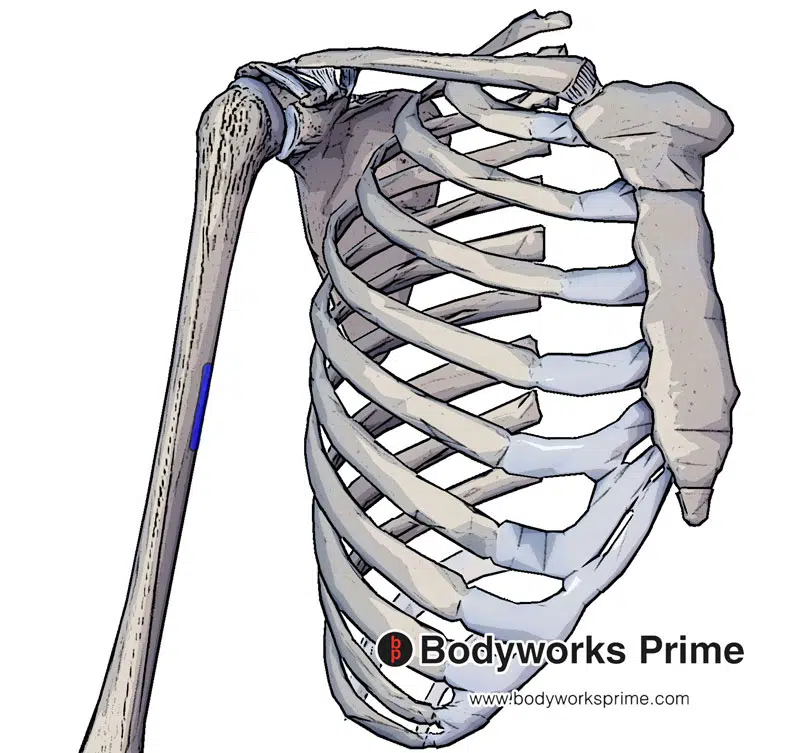
The insertion of the coracobrachialis muscle is the midshaft of the humerus (distal to the crest of the lesser tubercle) and it is highlighted here in blue.
Actions
The primary actions of the coracobrachialis are flexing and adducting the arm at the glenohumeral joint (shoulder). Shoulder flexion involves reducing the angle between the arm and the body’s frontal plane, such as lifting the arm forward. As for adduction, this involves drawing the arm closer to the body’s midline, moving it away from the lateral side. Another significant function of the coracobrachialis is to stabilise the arm during abduction, preventing deviation from the frontal plane [7] [8] [9].
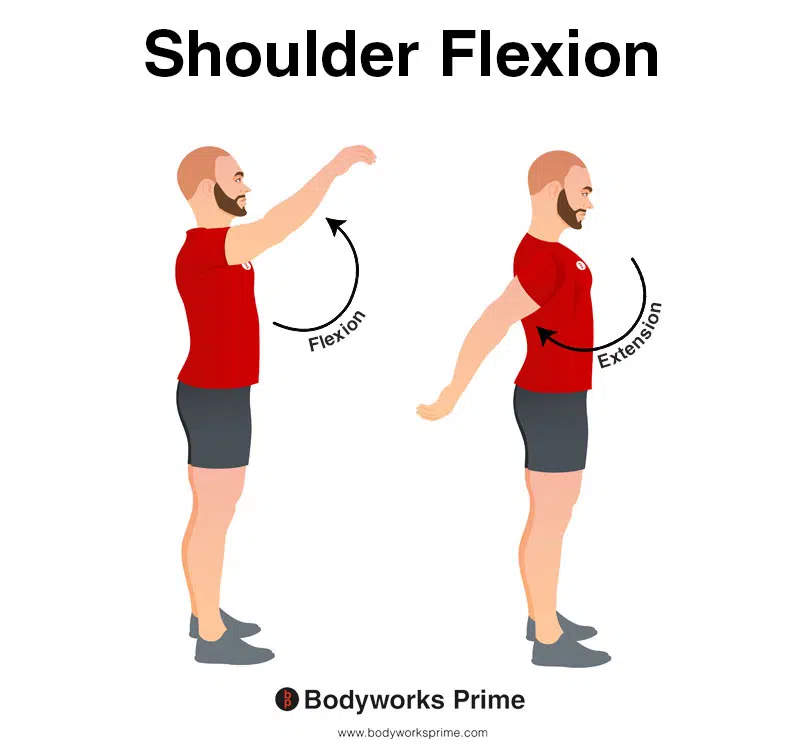
This image shows shoulder flexion. Flexion is where the arm is moves forward and upward in an anterior direction. The opposite of this is shoulder extension, which occurs as the arm is moved backward in a posterior direction. The coracobrachialis can assist with shoulder flexion.
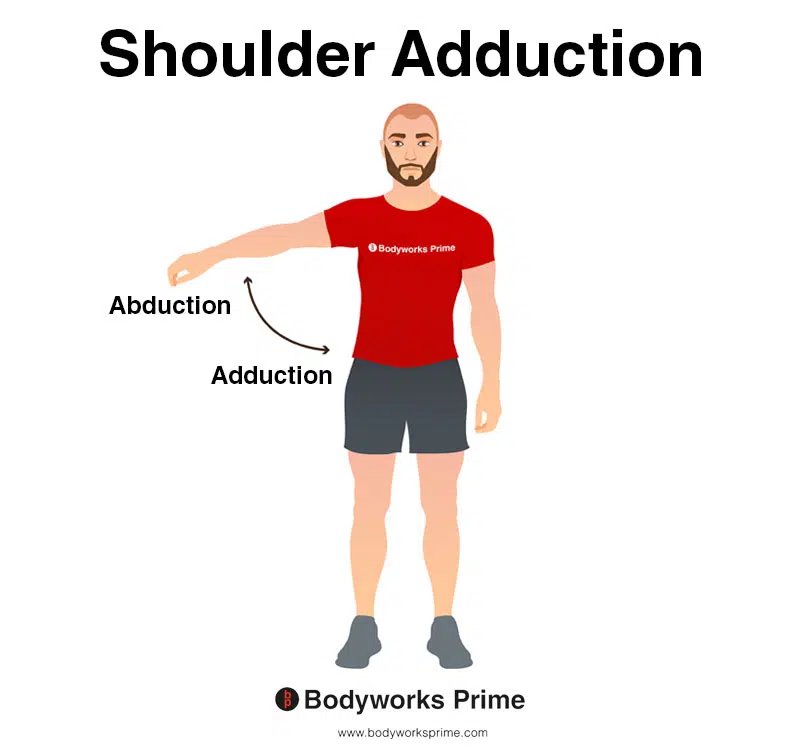
This image shows shoulder adduction. Adduction is where the arm is brought towards the midline of the body, reducing the angle between the arm and the torso. The opposite of adduction is abduction. Abduction occurs as the arm is moved away from the midline, increasing the angle between the arm and the torso. The coracobrachialis can assist with shoulder adduction.
Innervation
The coracobrachialis is innervated by the musculocutaneous nerve. This nerve originates from the lateral cord of the brachial plexus. The musculocutaneous nerve carries its fibers from the ventral rami of the spinal nerve roots C5-C7. As it decends, the musculocutaneous nerve passes through the coracobrachialis muscle, piercing it and also providing the innervation that allows for its contractions and movements. It is also worth noting that the musculocutaneous nerve also innervates the biceps brachii and the brachialis muscles, which are closely related in terms of their functions [10] [11].
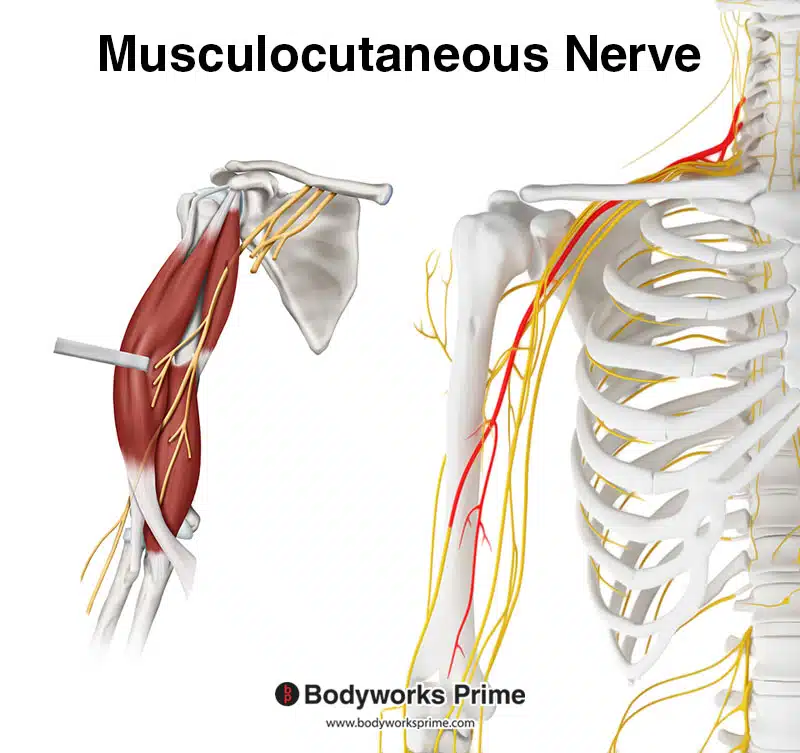
Here we can see the musculocutaneous nerve which is the innervation of the coracobrachialis.
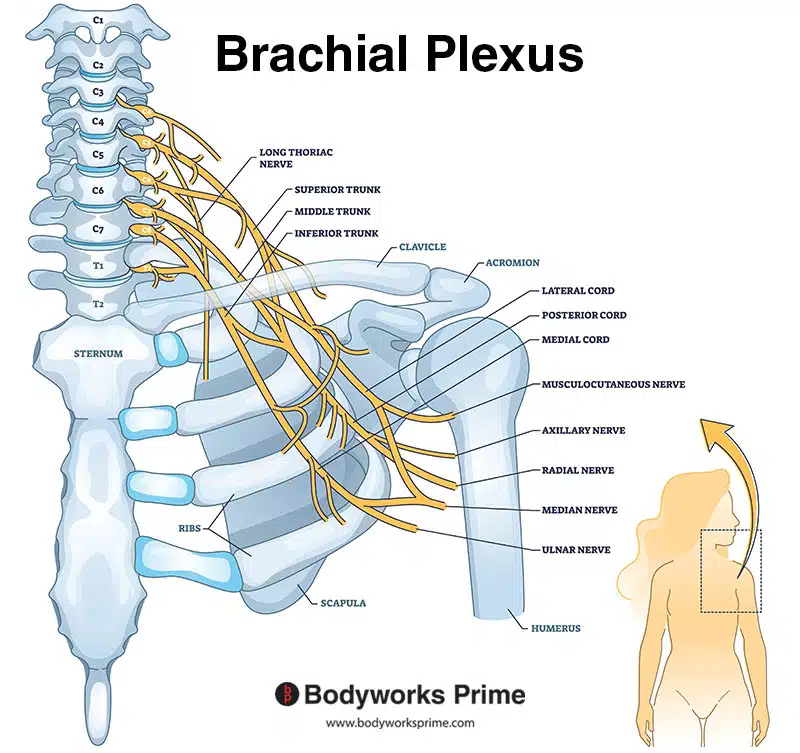
Here we can see an image of the brachial plexus. The musculocutaneous nerve is a part of the brachial plexus. The left part of the image shows how the musculocutaneous nerve pierces the coracobrachialis.
Blood Supply
The blood supply of the coracobrachialis muscle is primarily assured by branches of the brachial artery, ensuring the muscle receives adequate oxygen and nutrients necessary for its function. The brachial artery is the major blood vessel of the upper arm and continues from the axillary artery at the lower margin of the teres major muscle [12] [13].
Want some flashcards to help you remember this information? Then click the link below:
Coracobrachialis Flashcards
Support Bodyworks Prime
Running a website and YouTube channel can be expensive. Your donation helps support the creation of more content for my website and YouTube channel. All donation proceeds go towards covering expenses only. Every contribution, big or small, makes a difference!
References
| ↑1, ↑7 | Moore KL, Agur AMR, Dalley AF. Clinically Oriented Anatomy. 8th ed. Philadelphia: Lippincot Williams & Wilkins; 2017. |
|---|---|
| ↑2, ↑3, ↑5, ↑9 | Szewczyk B, Polguj M, Paulsen F, Podgórski M, Duparc F, Karauda P, Olewnik Ł. A proposal for a new classification of coracobrachialis muscle morphology. Surg Radiol Anat. 2021 May;43(5):679-688. doi: 10.1007/s00276-021-02700-1. Epub 2021 Feb 9. PMID: 33564931; PMCID: PMC8105249. |
| ↑4, ↑6, ↑12 | Standring S. (2015). Gray’s Anatomy: The Anatomical Basis of Clinical Practice, 41st Edn. Amsterdam: Elsevier. |
| ↑8, ↑13 | Georgiev GP, Landzhov B, Tubbs RS. A Novel Type of Coracobrachialis Muscle Variation and a Proposed New Classification. Cureus. 2017;9(7):e1466. Published 2017 Jul 13. doi:10.7759/cureus.1466 |
| ↑10 | Chouke, K. S. (1924). Variation of the coracobrachialis muscle. The Anatomical Record, 27(3), 157-163. |
| ↑11 | Desai SS, Arbor TC, Varacallo M. Anatomy, Shoulder and Upper Limb, Musculocutaneous Nerve. [Updated 2022 Sep 8]. In: StatPearls [Internet]. Treasure Island (FL): StatPearls Publishing; 2023 Jan-. Available from: https://www.ncbi.nlm.nih.gov/books/NBK534199/ |
